There are worrying signs in the region of Cyprus (Republic of Cyprus) of an economy reaching the brink of collapse and a people ready to revolt. As COVID-19 measures have affected the entire world, you can see the effects here as acutely as anywhere else that suffered a lockdown. A massive shift is coming, but whether it is for better or worse has yet to be determined.
Before the Virus Came
Until February/March, the cost of living had been on a steady increase. Some still felt the effects of the 2013 appropriation of savings, but the economy had gradually begun to improve; growing year on year. The city that received most of the benefit from this growth was Limassol, followed closely by Nicosia and Larnaca, with Paphos lagging at the back.
However, despite this fabulous growth pattern and Cyprus’ attractive packages for incoming businesses, a disturbing trend had begun to occur. Incoming and foreign companies, attracted by a low cost of living, paid a good salary by local standards, although slightly lower than a European average for the same work. On the other hand, local businesses were not catching up, so the incoming companies and the staff they brought with them, were on higher wages than anyone else.
The Numbers go Up, and Up, and Up
At the same time, property owners with an eye for profit started raising rental prices. All at once, the prices skyrocketed. Within two years, a 3/4 bedroom upper house within Limassol went from a reasonable €650/month up to €12-1300/ month.
This massive increase in the price of property rental drove many ordinary salaried people out of Limassol, into neighbouring villages and even to the next city. While property prices in Nicosia, Larnaca and Paphos remained lower, these people would also need transport to keep their jobs in Limassol. Sadly, salary increases did not reflect this wholesale increase in the cost of renting somewhere to live.
About a year before Coronavirus appeared on these sunny shores, property owners in Paphos, Larnaca and Nicosia, realised they could cash-in. While Limassol was driving renters out of the city with high rents, they could catch those leaving Limassol with rents lower than Limassol, but significantly higher than they could previously expect.
Where exactly do you expect people to live when a single bedroom apartment can command upwards of €800? And the average salary in Limassol is approximately €1500/month?
“You know it is a sign of a country thriving, and a city being very successful, when you can’t afford to live there.”
Dylan Moran 2004
At the same time, as property owners and rental agents were squeezing renters dry, employers were doing very little or nothing to assist their workers. Salaries remained low as if inflation had never reared its head, and property-owning opportunists kept piling on the pressure.
Then Came the COVID-19 Phenomenon
Some of us were lucky. Our employers didn’t rely on tourism, hospitality, or other local “non-essential” services to make them money. Consequently, we kept our jobs, worked from home (some of us doing full-time childcare at the same time) – going slowly crazy in the process. Life continued as well as it possibly could.
Others were not so lucky. The complete shutdown of all non-essential activities, airport closures, construction, many transport options, schools (although state teachers got paid), private schools, kindergartens and any number of services businesses caused utter havoc. It created massive numbers of people either on a reduced wage (60-70%) or wholly unemployed and unable to pay their way.
Thankfully, many people managed to keep their jobs open thanks to government subsidy and their employers’ financial stability. However, hospitality and tourism centred roles dropped significantly when Easter came around, and things were still in bad shape.
Travel Restriction = No Tourists
The Republic of Cyprus, despite a relatively recent influx of foreign business, is still primarily dependent on the tourism trade. Given our location as one of the most southerly points of Europe, the primary tourist season begins around Easter. It continues through Summer and into mid-Autumn when the weather starts to cool more significantly around October.
The season should have begun in early April. However, travel restrictions and lockdown were still in force. The result was millions in losses for the hospitality businesses dependent on seasonal trade. While restaurants were able to turn to Foody and other delivery services, bars and hotels couldn’t afford to maintain full staffing levels. Some couldn’t even survive long enough to open their doors once lockdown and travel restrictions ended.
Spring turned to Summer and continuing travel restrictions meant that the first tourists to the island could only come from specific countries (with low numbers of infections from COVID-19). None of which provide the majority of Cyprus’s tourists. Even when British tourists returned, the number of tourists was a fractional trickle compared with previous years. By this point, thousands of seasonal and year-round hospitality workers had given up all hope of financial recovery in 2020.
Property Market, Salaries & Golden Visas
Strangely, the average salary has increased. However, the reason for that is not that actual wages have increased. Those who have managed to retain their employment, keep working and essentially return to a functional “normality” are those either in government roles or with international companies, which have remained unaffected by the global pandemic – some even buoyed by it.
What’s more, Limassol rental prices have stayed comparatively high in the aftermath. More worryingly, they are also predicted to rise as the property resale market has decreased significantly. Houses that only one year ago would have entered the market for €750,000 or more are now advertised at €500,000 or less. This puts property owners and those who make their living buying and selling property in a challenging position.
“If I can’t sell for a profit, I’ll just have to rent high for it, instead”
There are multiple reasons for the drop in the property sales market. While COVID-19 has had a significant impact, there are also changes to legislation and an EU crackdown concerning “investment passports”. Consequently, there are fewer people with vast amounts of money to invest in property; attempting to gain European citizenship. Fewer Russians and Chinese are trying to buy admission to the European Market.
So, property owners can’t sell, and people can’t buy without a 25-30% deposit (and a generous salary). Yet the renter gets squeezed at every available opportunity. People without jobs can’t rent at current prices.
Penny-pinching and Salary Squeezing
I thank providence and fate that I’m not job-hunting right now. My LinkedIn account is active and functional for networking, work-related use and occasional job hunting. Consequently, it makes sense that some of my contacts are in the recruitment business. When I see some of the roles they advertise appear on my feed, it astonishes me.
The island might be full of people seeking work, so competition is high. Still, asking so much for so little compensation is ridiculous.
This morning, two jobs appeared on my feed. Two roles in the same industry, with similar experience and qualification requirements.
Both roles were for accounting jobs; auditors and bookkeepers I have to share one in particular… it astounded me and made me want to cry. But first I want to show you what the average salary for an accountant is in Limassol.
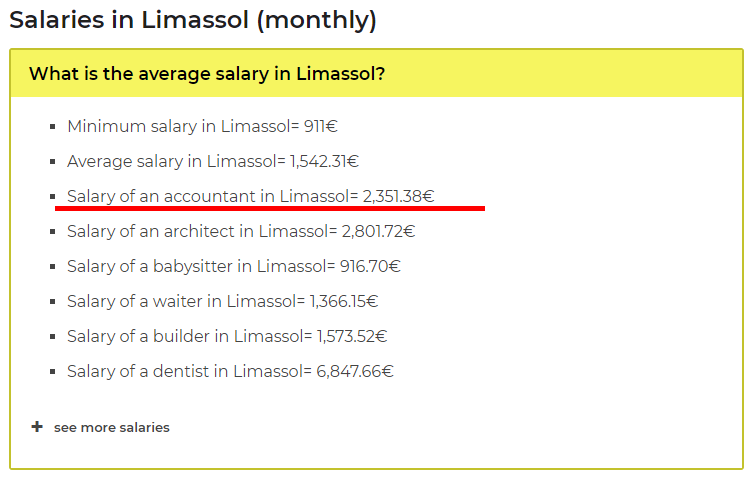
Now, I’d like you to think about how much these particular accounting roles were offering a skilled, experienced professional, for 36-40hrs/week. I bet you can’t imagine how low these employers are willing to go. While businesses start to try and recoup their losses, they are shaving their outgoings to as little as humanly possible.
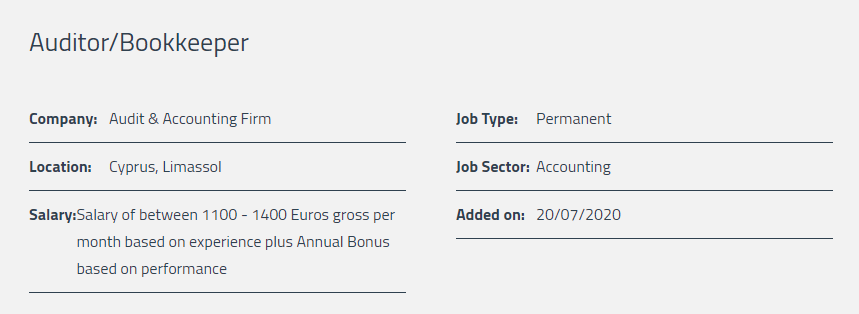
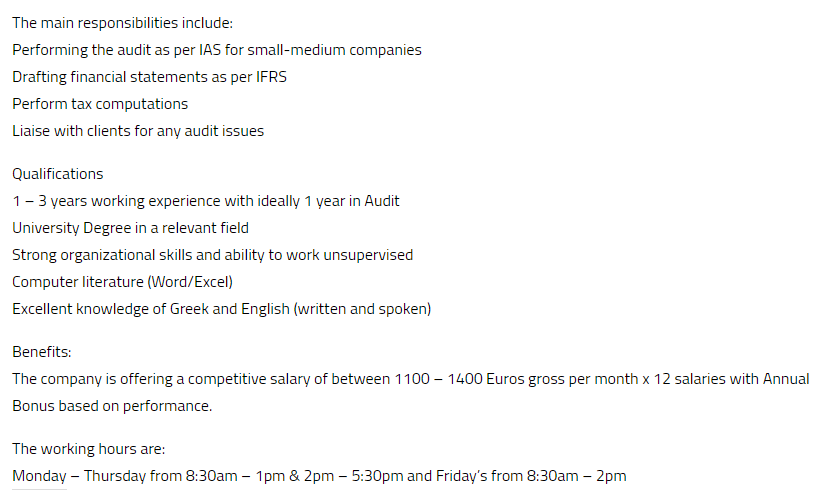
Was it worth paying for the university degree?
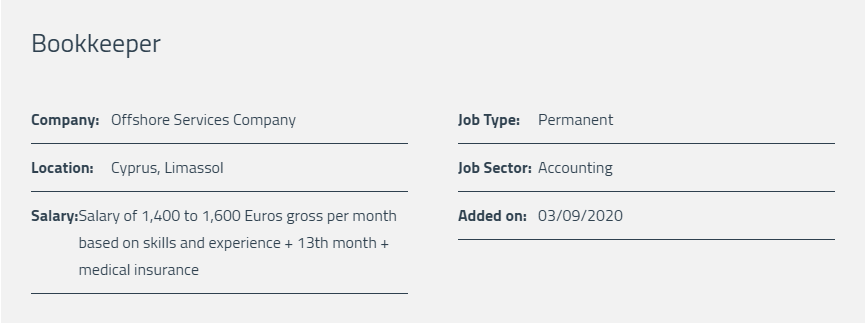
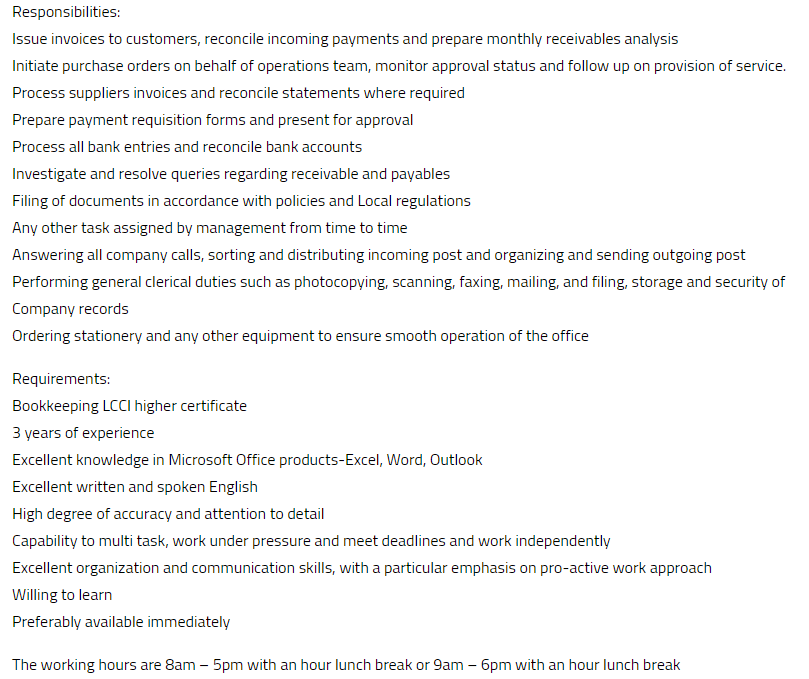
The auditor would barely be able to maintain a roof over their head. Let’s not talk about the company wanting a bookkeeper, office manager and receptionist all in a pitifully small package. I can’t be the only person entirely baffled by the sheer cheek these companies are displaying.
Many people are seeking work due to the awful circumstances leading to the collapse of tourism this year. Yet, most of them are hospitality and service-oriented. It’s not like there is a surplus of skilled bookkeepers and auditors out there.
A Change is Gonna Come
The massive imbalance between greed and survival are astounding, and it can’t continue. Something is going to give. When skilled, experienced people can’t afford a home because companies are artificially shrinking wages the workforce will rebel, or leave. If that same greed for profit is also artificially raising rental prices, there’s nowhere for people to go.
When companies can’t afford to pay their staff enough to maintain their standard of living, because greed has priced their workforce out of the market, those companies will leave, and go elsewhere.
Everyone who bought a property at inflated prices while the economy was growing, will not be able to afford mortgage repayments when the rental prices drop. Those who increased rental prices, to squeeze the maximum from the skilled migrant workers, will find acquaintances employed by those people out of a job when the company moves away.
Let’s not forget all the massive skyscraper office buildings and apartments along the Limassol seafront. Who will buy or rent them if we chase away businesses and skilled workers with the inflated cost of living?
There has been discussion of placing a cap on rental prices according to the size/location/quality of the properties in question. However, people need to rent high enough to cover mortgage repayments because they bought high. Those same property owners can’t sell now, because they are likely in negative equity. While this is still the case, the government can’t place a cap too low. Otherwise, they risk hundreds of people defaulting on loans.
There will be a reckoning.
Cyprus has already suffered the brain drain effect. There were always better opportunities abroad and Cypriot companies didn’t pay skilled workers enough to cover education costs. It will happen again. What’s more, without the attractive draws of low living costs, a better quality of life and a pool of skilled workers, companies will avoid bringing their business here.
This is a small nation that needs to improve its relationships with international business to avoid the perpetual reliance on tourism. Conversely, we seem to be doing everything in our power to drive them away.
It’s obvious that opportunism and greed will eventually lead to the downfall of the economy, industry, and innovation. When you eliminate all of the benefits that draw businesses to your country, you decimate the flow of investment.
